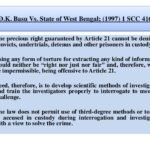MOHUA launches Socio-Economic Profiling of PM SVANidhi beneficiaries (Pradhan Mantri Street Vendor’s Atmanirbhar Nidhi Yojana)

Ministry of Housing and Urban Affairs launched a programme of Socio-Economic Profiling of PM SVANidhi beneficiaries and their families , as an additional component of PM SVANidhi Scheme, Under this, a complete profile of each PM SVANidhi beneficiary and their family members will be prepared.
Based on the profiled data, benefits of the various eligible Central Schemes would be extended to them for their holistic socio-economic upliftment. In the first phase, 125 cities have been selected for the programme. The profile will identify potential eligibility of beneficiaries and their family members for select Central Government schemes and facilitate linkages. Besides this, the States/ UTs would also have an option to extend their respective State/ UT specific welfare schemes to them
LEARNING FROM HOME/ WITHOUT CLASSES/ BASICS
PM SVANidhi Scheme was launched on June 1, 2020 for poor people selling goods on roads and tracks, who were affected due to the coronavirus pandemic. The scheme is a Central Sector Scheme i.e. fully funded by Ministry of Housing and Urban Affairs with the following objectives: (i) To facilitate working capital loan up to `10,000;
(ii) To incentivize regular repayment; and (iii) To reward digital transactions.
Urban street vendors will be eligible to avail a Working Capital (WC) loan of up to `10,000 with tenure of 1 year and repaid in monthly instalments. For this loan, no collateral will be taken by the lending institutions. On timely or early repayment, the vendors will be eligible for the next cycle of working capital loan with an enhanced limit. No prepayment penalty will be charged from the vendors for repayment before the scheduled date
Street Vendors (Protection of Livelihood and Regulation of Street Vending) Act, 2014.
In its landmark judgement of September 9, 2013 in the Maharashtra Ekta Hawkers Union vs. Municipal Corporation of Greater Mumbai case, the Supreme Court stated, “street vendors … are a harassed lot and constantly victimised by the officials of the local authorities, the police, etc, who regularly target them for extra income and treat them with extreme contempt.”
Even the Supreme Court, while pointing out that street vendors have a fundamental right to their occupation as per Article 19 (1) (g) of the Constitution, has acknowledged the exploitation of hawkers by state authorities.
The act is a initiative to protect the livelihood rights and social security of urban street vendors in the country and thereby aid poverty alleviation efforts of the Government.
The Act aims at fostering a congenial environment for the urban street vendors to carry out their activities without harassment from any quarter. It also provides for regulation of urban street vending and is uniformly and mandatorily applicable to all the States and Union Territories.
The Street Vendors Act, 2014 is a truly innovative solution to the problem of balancing the livelihood rights of hawkers and the right to free movement of pedestrians and traffic.
The legislation lays down four fundamental provisions:
one, there will be a survey of all existing hawkers;
two, instead of licences, certificates of vending will be issued to all existing hawkers identified in the survey;
three, vending and non-vending zones will be demarcated and all hawkers accommodated in the vending zones;
and four, no hawker will be evicted from his/her spot unless and until the survey has been done and certificates of vending issued.
the Town Vending Committee (TVC), which will have representation from street vendors, traffic police, police, Resident Welfare Associations (RWAs), market associations, and the planning authority, among others, and be headed by the municipal commissioner.
It is the TVC which is mandated to organise the survey, decide on vending/non-vending zones, issue certificates, decide on vending fees that the hawkers should pay the municipality, publish the street vendor’s charter, and so on.






0 Comments